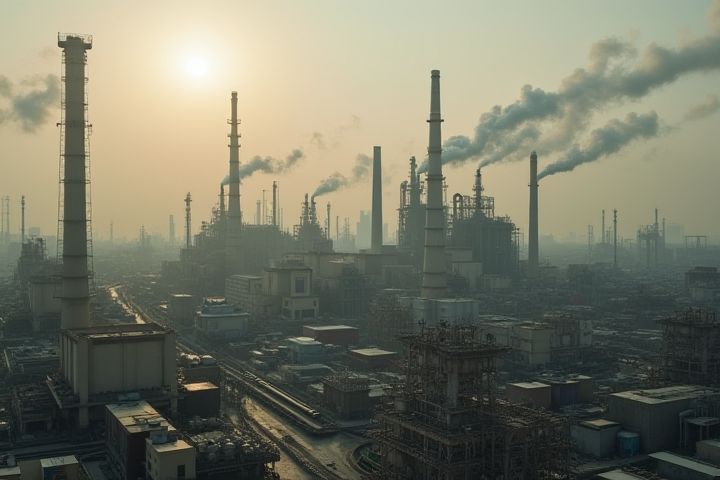
Industrialization in Nigeria has significantly transformed the economic landscape, presenting opportunities for growth and development. The nation's rich natural resources, such as oil, gas, and minerals, have attracted both local and foreign investments, fostering diverse manufacturing sectors. You can observe a notable increase in industries like textiles, agro-processing, and cement production, which contribute to job creation and skill development. Government initiatives aimed at improving infrastructure, such as roads and power supply, further support industrial growth. Despite challenges like inadequate funding and a fluctuating economy, Nigeria's industrialization journey continues to evolve, positioning the country as a burgeoning market in West Africa.
Diversification from Oil
Nigeria's industrialization efforts are increasingly focusing on economic diversification beyond oil dependency, aiming to stimulate growth in sectors such as agriculture, manufacturing, and technology. The government has invested in initiatives to improve infrastructure, enhance skills training, and promote local entrepreneurship, which are vital for creating a more resilient economy. As a result, industries such as agro-processing and textile manufacturing are gaining traction, providing job opportunities and reducing unemployment rates. By fostering innovation and encouraging foreign investment, Nigeria aspires to build a sustainable economic framework that can withstand global oil market fluctuations.
Government Policies
Government policies in Nigeria play a crucial role in shaping the landscape of industrialization, driving economic growth and development. The Nigerian Industrial Revolution Plan (NIRP) aims to enhance manufacturing capabilities, promote value-added production, and create employment opportunities. Policies such as tax incentives, investment in infrastructure, and support for small and medium-sized enterprises (SMEs) are designed to stimulate industrial activities and attract foreign direct investment (FDI). By fostering collaboration between public and private sectors, these policies strive to build a competitive industrial environment that supports sustainable economic progress.
Infrastructure Development
Nigeria's industrialization is significantly driven by infrastructure development, which includes the enhancement of transportation networks such as roads, railways, and ports. Reliable electricity supply is crucial, as investments in power generation and distribution directly impact manufacturing efficiency and business operations. The government's commitment to creating industrial parks and special economic zones fosters a conducive environment for local and foreign investments. By prioritizing urban infrastructure and technological advancements, Nigeria aims to boost economic growth and increase its global competitiveness.
Foreign Investment
Industrialization in Nigeria is heavily influenced by foreign investment, which plays a crucial role in driving economic growth and development. Major sectors attracting foreign capital include oil and gas, telecommunications, and agriculture, where international companies seek opportunities to tap into the nation's abundant resources and market potential. The Nigerian government has implemented various policies to create a favorable environment for foreign investors, such as tax incentives and improved infrastructure. You can observe the impact of these investments through the growth of manufacturing facilities and job creation, significantly contributing to the country's economic landscape.
Manufacturing Growth
Nigeria's industrialization strategy emphasizes manufacturing growth, aiming to reduce dependence on crude oil exports and enhance economic diversification. The Nigerian government promotes policies to attract foreign direct investment (FDI), targeting sectors such as textiles, food processing, and automotive production. Initiatives like the National Industrial Revolution Plan (NIRP) seek to improve infrastructure, boost local production capabilities, and increase employment opportunities within the manufacturing sector. Your engagement in local industries can contribute to a more sustainable economic landscape while fostering innovation and technology adoption.
Export Promotion
Nigeria's industrialization strategy emphasizes export promotion as a means to diversify the economy and improve trade balance. The government fosters the development of sectors such as manufacturing, agriculture, and technology, aiming to increase the production of goods suitable for international markets. Efforts include the establishment of export processing zones and incentives for local businesses to enhance competitiveness on a global scale. You can expect significant economic growth as these initiatives lead to job creation and increased foreign exchange earnings, positioning Nigeria as a key player in the global market.
Energy Challenges
Nigeria's industrialization faces significant energy challenges, primarily due to inadequate electricity supply and reliance on fossil fuels. The country suffers from frequent power outages, which hinder productivity in manufacturing and other sectors. Renewable energy sources, such as solar and wind, present viable alternatives that could enhance energy accessibility and sustainability. Addressing these energy issues is crucial for fostering economic growth and improving the overall quality of life for Nigerian citizens and businesses.
Skilled Labor Force
Nigeria's industrialization strategy emphasizes the development of a skilled labor force to drive economic growth and productivity. By investing in education and vocational training programs, the government aims to equip citizens with the technical skills required for various sectors, including manufacturing, technology, and agriculture. This focus not only enhances employment opportunities but also fosters innovation and competitiveness within the local market. As a result, your engagement in skill development initiatives can significantly contribute to the nation's industrial progress and economic stability.
Industrial Clusters
Industrial clusters in Nigeria play a crucial role in driving economic growth and enhancing productivity. These clusters foster collaboration among small and medium-sized enterprises (SMEs), ensuring access to shared resources, technological innovations, and skilled labor. Prominent examples include the Lekki Free Trade Zone, which leverages a strategic location for trade, and the Kano Textile Cluster, known for reviving Nigeria's textile industry through local craftsmanship. By facilitating specialization and reducing operational costs, these industrial clusters significantly contribute to Nigeria's overarching industrialization strategy.
Environmental Impact
Industrialization in Nigeria significantly influences the environment, particularly through increased greenhouse gas emissions from factories and power plants. Urban areas experience heightened air pollution levels, leading to health issues among residents and contributing to climate change. Moreover, industrial activities often result in water contamination from chemical runoff, adversely impacting local ecosystems and drinking water sources. Efforts to promote sustainable practices and enforce environmental regulations are critical to mitigating these detrimental effects while supporting economic growth.
